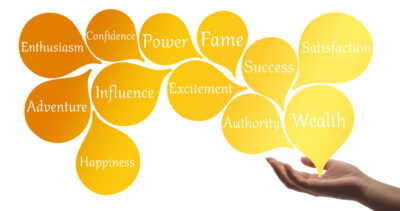What’s on my mind this week is our exposure to countless messages telling us that we can be more, better, even exceptional through personal change. We’re bombarded with ads for books, webinars, and workshops that will help us change who we are and create a new self, one that will bring us the things we’ve always wanted.
You’re Not Okay!
The message is that if we’re not happy, we can (and must) change who we are. Often we don’t know what we want to change. We just know that things don’t feel right. So we grab at something new…a new diet, a new romance, or a unique business opportunity. We’ve been told that:
- We can be anything we want to be.
- We can reinvent ourselves.
- We can live bigger, better lives.
Perhaps, these messages are meant to help us, but I think they make us  suffer by bringing up feelings of discomfort, shame, or self-doubt. Then we want to push away these painful feelings with daydreams of what could be. Our identity becomes linked with the fantasy of our future self, that self that is happier, braver, richer, or sexier.
suffer by bringing up feelings of discomfort, shame, or self-doubt. Then we want to push away these painful feelings with daydreams of what could be. Our identity becomes linked with the fantasy of our future self, that self that is happier, braver, richer, or sexier.
We criticize our present imperfect self. We hope to replace it with one that deserves a more desirable future—a future self we are being programmed to crave. Comparing our current selves to the imaginary brighter, shinier future self, we continue to suffer because change, while presented as uncomplicated, is often difficult to achieve (something the marketers don’t put in their ads).
I too have been caught up in the fixation to improve my thinking, behavior, and even my personality.
I’m Not Okay!
There are things I want to change about myself. I really want to be one of those animated jumping-up-and-down types of speakers…swaggering across the stage and back again…waving my hands around to emphasize my points. But I’m not that.
I’m low key. But I can stand in front of a room of any size, as I have many times, and command the attention of everyone there just as professionally and quickly as someone who thunders and rumbles. I do it in my own naturally unpretentious way. But I believe I should be different than I am.
I have tried to change. I’ve taken improv classes (they’re stimulating, and I recommend them for fun and to meet interesting people). But I did not learn how to parade around on the stage. (I tried it, with a lot of encouragement from my classmates, but it’s just not me.)
I know I bring valuable skills to each teaching and speaking opportunity. For example, I am able to create a friendly, safe, and open environment where participants can relax and engage with me and each other. But I still want to be that outrageous performer.
They’re Not Okay but they don’t know it!
What started me thinking about our obsession with personal change was seeing the play Under Milk Wood last weekend. In 1954, Dylan Thomas wrote Under Milk Wood as a radio play, and it has been performed in theaters and made into a movie as well. Under Milk Wood shows us a day in the life of the residents of a small Welsh seaside town.
What I noticed most was the contrast between how quickly we, who live in contemporary society, feel driven to change our circumstances when we are dissatisfied, compared to the residents of this small town who lack the passion for personal transformation. We’re rushing around changing everything we can, while the characters in the play cling to the past and nothing changes for them.
There is a predictable everydayness to the character’s lives and their acceptance of existence just as it is, with all it’s disappointments and losses, as well as small moments of surprise and joy. And no one is going to self-help groups, or therapy, or retreats to reinvent their lives. In fact, they are doing the same things they have always done, living the lives they have always lived, and will continue to live those lives with a peaceful submission to the way things are.
All the same, there is suffering.
There’s a woman whose true love died, and now she has lovers who are only stand-ins for him. We watch her engage in sexual relations with different men (today, we might call her behavior compulsive and recommend a 12-step program). And we hear many other characters reliving earlier, more hopeful times. The residents live out their stories, the autobiographies they know are real for them, which no one challenges with promises of more or better. These stories define who they are and comprise their identities. Everything is in its right place, and no one wants to disrupt it, despite the pain and suffering.
There is another possibility—being courageous enough to accept who you are.
We’re All Okay!
I choose to neither passively accept circumstances that keep me in chains and frustrated, nor to compulsively reinvent myself. Most of the enticing offers we receive don’t deliver what they promise anyway.
What if you were able to sit with these uncomfortable feelings and not rush to avoid them? To sit with the feelings requires slowing down enough to get in touch with yourself, and then instead of jumping into a one-time fix, accept what you are experiencing.
- What if you sat with the discomfort of not being perfect in some aspect of your life instead of rushing out to fix yourself?
- What if you could stay present instead of spending so much time living in the long-gone past?
Before you can be fully present in your life, you need to have the courage to know yourself. It sounds simple, but it’s not, because to know yourself, you need to be open to things that we have not been taught:
- The possibility of accepting ourselves, both things we like and dislike about ourselves, without running away. Recognizing the thoughts that drive us to escape from ourselves: we’re not enough, we’ll never get it right, what if people knew I was such a jerk, and similar negative self-talk.
- The willingness to stop living in the memories of better days that likewise imprisons us. While these memories give us pleasure, they also make personal change unimaginable. They keep us isolated in fantasy and separate from other people.
Would that be difficult for you? It was for me. I never heard anyone talk about self-awareness or self-acceptance growing up. But I am forever grateful that I discovered them as alternative approaches for dealing with my negative self-talk and negative judgments.
I believe we have the right to change anything we want about ourselves. But I am emphatic that personal change needs to start from a gentle place, a place that gives us a foundation of self-acceptance and self-love. If we start there, we can better choose which change will be truly right for each of us.








